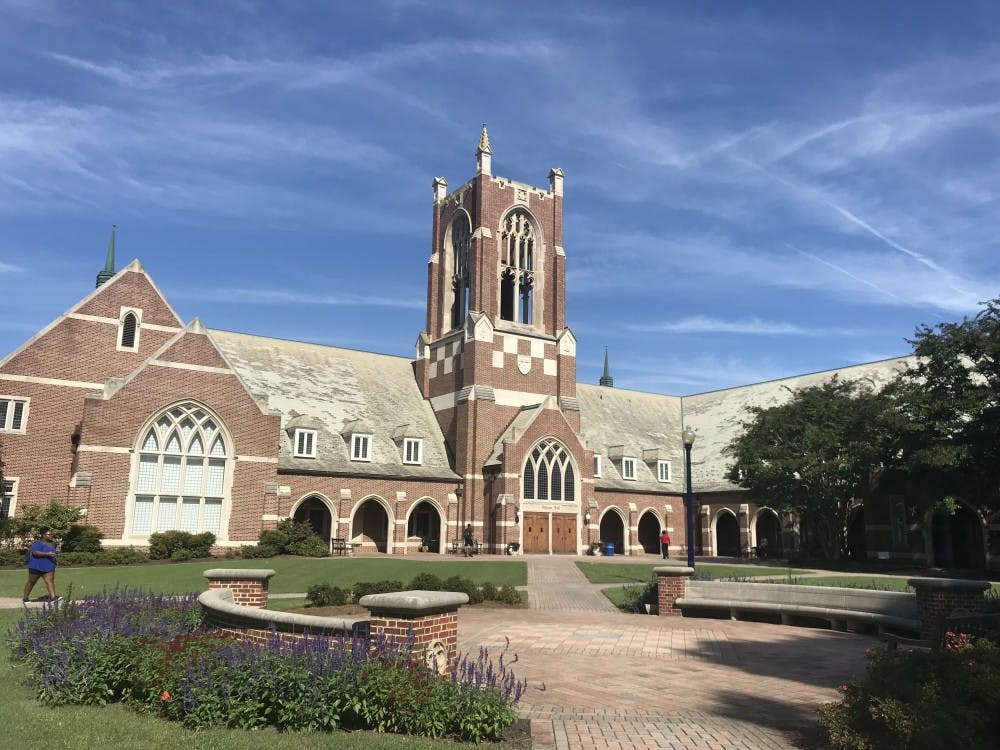A University of Richmond student has spearheaded an initiative to encourage the university to develop an official statement or policy regarding freedom of speech on campus.
Alec Greven, a sophomore majoring in philosophy, politics, economics and law, said he had been inspired during his first-year seminar class last year to investigate the university’s current stance on free speech.
His class research led him to the Foundation for Individual Rights in Education (FIRE), which had ranked the UR’s freedom of expression policies as having a red light, Greven said.
“This ranking means that the university had clearly and substantially limited freedom of expression,” Greven said.
This ranking has since been upgraded to a yellow light, he said. A yellow-light ranking means the university has “at least one ambiguous policy that too easily encourages administrative abuse and arbitrary application,” according to the FIRE website.
Greven, who serves as the executive secretary for the Richmond College Student Government Association, has worked to change this ranking, he said. In the spring semester of last year, he started to draft a resolution to present to RCSGA that outlined his proposed changes, Greven said.
The issue with the university’s current policy is that its statements regarding freedom of expression are vague, Greven said. His goal is for UR to adopt a statement that clearly defines the rights and responsibilities of students in regard to freedom of expression, Greven said.
Javier Hidalgo, a political theorist and associate professor of leadership studies, taught Greven during the first-year seminar that inspired him to start his initiative, The Philosophy of Freedom. The content of the class involved examining speech codes from various schools, Hidalgo said.
“We consider the pros and cons of speech codes on campus,” Hidalgo said. “We read opinions from both sides."
Hidalgo encourages debate and disagreement among the students in his classes, he said.
“No idea is off the table, as long as you can give a reason for it,” Hidalgo said.
Hidalgo does not believe that the current university administration is abusing the vague policies in the school’s speech codes, but adopting a formal free-speech policy on campus would communicate that the guiding value of the university is open discussion, even with those of different opinions, he said.
Enjoy what you're reading?
Signup for our newsletter
“It would communicate to students, faculty and administration that they can speak up about their convictions,” Hidalgo said.
After learning about speech codes and UR's FIRE rating in Hidalgo’s class, Greven began working to develop his initiative. Although he has received support from groups he has presented to, he has created this initiative independently, Greven said.
Greven hopes that UR will adopt a policy similar to the University of Chicago’s 2015 Report of the Committee on Freedom of Expression, he said. The Chicago report explicitly affirms the school’s commitment to freedom of expression and promoting free dialogue, Greven said. The resolution that Greven drafted outlines this goal.
“The resolution asks the faculty senate to adopt a comprehensive policy on freedom of expression, specifically one that embodies the principles of the Chicago statement,” Greven said.
Greven first presented the resolution to RCSGA with the support of RCSGA president Tyler York, Greven said.
After Greven presented the resolution, the members of RCSGA discussed and suggested amendments to it, York said. Eventually, RCSGA passed the resolution unanimously, York said.
The process of proposing resolutions to RCSGA was implemented two years ago as a way to increase student involvement in the governing process, York said.
“Resolutions help us to have clarity when presenting to administration, so they know exactly what the position of RCSGA is,” York said.
There is currently no resolution process in Westhampton College Government Association, York said. Greven presented his ideas to the executive board of WCGA and then to the body of WCGA, Greven said.
A joint committee between RCSGA and WCGA signed a report in support of the resolution, York said.
“This is our way of making sure to show that both bodies are on the same page,” York said.
After Greven’s resolution received the support of both student governments, he spoke with University President Ronald Crutcher, Provost Jeff Legro and Richmond College Dean Joe Boehman, Greven said.
“President Crutcher seemed very supportive of this issue,” Greven said.
Greven then presented his resolution to the faculty senate, he said.
“I introduced the content and background of the resolution and answered questions,” Greven said.
The faculty senate is still in the process of determining what steps to take on this issue, Greven said. The faculty senate has the authority to issue an official statement or make changes to the university’s policy on freedom of expression, Greven said.
Greven believes that the current university administration has handled issues of freedom of expression appropriately, he said. He wants clear policy language to ensure that no future administration could use these vaguely worded policies to abuse authority, Greven said.
Hidalgo said that although the university’s enforcement of freedom of expression policies seemed good, the current written policy was far too expansive in what it restricted. Administration has the authority to get involved in an issue because somebody was offended, Hidalgo said.
“Education should be painful – that’s how you learn the most,” Hidalgo said.
Contact news writer Jaclyn Opie at jaclyn.opie@richmond.edu
Support independent student media
You can make a tax-deductible donation by clicking the button below, which takes you to our secure PayPal account. The page is set up to receive contributions in whatever amount you designate. We look forward to using the money we raise to further our mission of providing honest and accurate information to students, faculty, staff, alumni and others in the general public.
Donate Now



